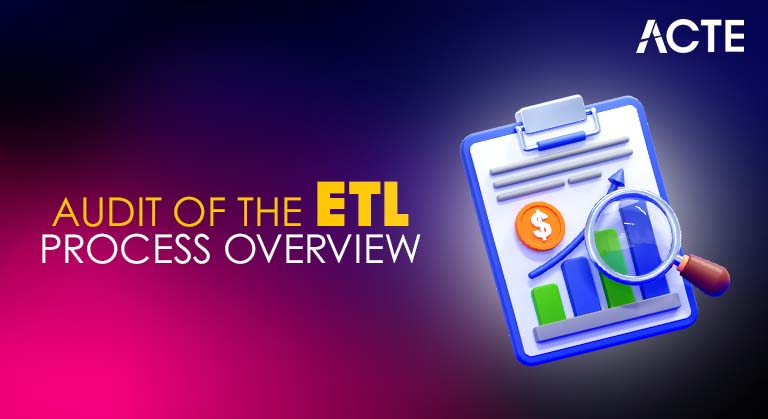
- Introduction to ETL
- Importance of ETL Audits
- Data Quality Checks
- Logging Mechanisms
- Error Handling
- Audit Trail Creation
- Tools for ETL Auditing
- Compliance Requirements
Introduction to ETL
ETL, short for Extract, Transform, Load, is a core component in modern data management systems, especially within data warehousing environments. The ETL process in data warehouse architecture serves as the backbone for moving data from various sources into a centralized repository where it can be analyzed effectively. In the ETL extract-transform-load process, data is first extracted from multiple sources such as databases, APIs, or flat files, then transformed to align with business logic and reporting needs, and finally loaded into the target system, typically a data warehouse an essential workflow often covered in Database Training programs. This structured flow ensures that data is clean, consistent, and ready for analytical use. One critical yet often overlooked aspect is the Audit of the ETL Process, which ensures data integrity, tracks historical changes, and verifies that each stage of the ETL pipeline is functioning correctly. Auditing helps organizations maintain compliance, identify data issues early, and optimize performance across their data ecosystem. Without proper auditing, even well-designed ETL systems can produce unreliable insights. As data becomes increasingly vital for decision-making, understanding and implementing robust ETL strategies is essential for any organization looking to leverage its data effectively and efficiently.
Do You Want to Learn More About Database? Get Info From Our Database Online Training Today!
Importance of ETL Audits
- Ensures Data Accuracy: Auditing helps identify discrepancies or errors during data transformation, ensuring the final output is accurate and reliable.
- Tracks Data Lineage: ETL audits provide transparency by recording the flow and transformation of data, helping teams trace back to the origin of any issue an important practice highlighted in an Overview of SQL Server Certification course.
- Facilitates Regulatory Compliance: With growing data regulations, maintaining audit logs helps businesses comply with standards like GDPR and HIPAA.
In today’s data-driven world, the reliability of information flowing through ETL (Extract, Transform, Load) pipelines is crucial for making accurate business decisions. ETL audits play a vital role in validating and verifying the flow of data across systems, ensuring both integrity and compliance. Whether you are using traditional ETL software or advanced platforms like Databricks ETL or AWS ETL tools, incorporating audit mechanisms is essential to maintain trust in your data.

- Improves Troubleshooting Efficiency: Audit trails help quickly pinpoint where in the pipeline a failure or inconsistency occurred, speeding up resolution time.
- Enhances Performance Monitoring: Auditing highlights bottlenecks in the ETL process, allowing for better tuning of cloud integration pipelines and ETL tools list selections.
- Strengthens Data Governance: ETL audits reinforce governance strategies by maintaining a clear record of operations across diverse platforms and tools.
Data Quality Checks
Data quality checks are a critical aspect of maintaining trust and accuracy within any data pipeline, especially in the ETL process in data warehouse environments. As data flows through the ETL extract transform load stages, there is a high risk of introducing errors due to inconsistencies, missing values, duplicates, or incorrect formats. Implementing robust data quality checks at each phase extraction, transformation, and loading ensures that only clean, valid, and meaningful data enters the warehouse for analysis. These checks often include validations for data type, format, range, uniqueness, and referential integrity. Without these controls, decisions made from faulty data can lead to costly business errors highlighting the importance of data quality, a Top Buzzword in Database Management today. Integrating quality checks as part of the Audit of the ETL Process further enhances accountability by logging anomalies, tracking resolution steps, and generating alerts for deviations. This audit-driven approach not only improves the reliability of the ETL pipeline but also supports compliance and governance by maintaining a transparent data trail. In modern data ecosystems, where data originates from multiple sources and formats, quality checks serve as the first line of defense against bad data. By embedding these validations directly into the ETL workflow, organizations can confidently use their data warehouse as a single source of truth for critical decision-making.
Would You Like to Know More About Database? Sign Up For Our Database Online Training Now!
Logging Mechanisms
- Operational Monitoring: Logs track the status of ETL jobs, including start and end times, helping teams monitor performance and uptime.
- Error Detection and Troubleshooting: Detailed logs capture transformation errors, load failures, or connection issues, enabling faster issue resolution skills commonly emphasized during Database Training.
- Data Lineage Tracking: Logging provides a step-by-step record of data movement and transformations, supporting better traceability.
Logging mechanisms are an essential part of any robust ETL extract transform load process, providing visibility, traceability, and accountability at every step of the data pipeline. In the context of the ETL process in data warehouse environments, logging helps monitor operations, detect anomalies, and ensure seamless data movement from source to target systems. These logs also play a foundational role in the Audit of the ETL Process, offering detailed insights into what happened, when, and why.

- Audit Trail Generation: Logs serve as the backbone for the Audit of the ETL Process, ensuring compliance and transparency in data handling.
- Performance Benchmarking: Logging enables analysis of job duration and resource usage, helping optimize the ETL process in data warehouse systems.
- Change Management: Logs document configuration changes or version updates, supporting accountability and rollback strategies if needed.
- Data Lineage Visibility: Audit trails help map the journey of data from source to destination, giving full visibility into how data was transformed and by which process.
- Compliance and Regulatory Support: Maintaining audit logs is essential for meeting industry standards and regulations, especially in sensitive data environments.
- Issue Diagnosis and Debugging: A well-maintained audit trail allows teams to quickly identify and resolve errors or inconsistencies in the ETL flow reinforcing data traceability concepts often introduced when you Learn ER Diagram fundamentals.
- Change Tracking: Logs track modifications to workflows, scripts, or configurations within ETL software and tools, helping manage version control.
- Security and Access Monitoring: Audit trails log user activities, ensuring unauthorized access or manipulation can be detected and investigated promptly.
- Tool-Agnostic Integration: Whether using tools from the ETL tools list, Databricks ETL, or AWS ETL tools, audit trails can be implemented to work seamlessly across multi-platform cloud integration setups.
Error Handling
Error handling is a critical component of any ETL (Extract, Transform, Load) pipeline, ensuring that data processes run smoothly even when unexpected issues arise. Whether using traditional ETL software, open-source solutions, or modern platforms like Databricks ETL or AWS ETL tools, a well-designed error handling mechanism helps prevent data loss, duplication, and integrity issues. In complex cloud integration environments where data flows across various systems and formats, errors can occur at any stage during extraction from source systems, transformation of data types, or loading into target warehouses challenges often addressed in a Guide to Data Warehouse Tools. Effective error handling involves capturing error messages, logging failed records, applying retries, and notifying administrators in real-time. Many tools from the ETL tools list offer built-in features for error detection, automated rollbacks, and fallback strategies that keep the data pipeline resilient. For instance, AWS Glue and Databricks provide configurable error logs, retry mechanisms, and workflow orchestration to manage failed tasks. Implementing structured error handling not only minimizes disruptions but also improves the reliability and scalability of ETL processes in production. As data ecosystems grow in size and complexity, robust error handling becomes essential for maintaining data quality, operational continuity, and business trust in automated data workflows.
To Earn Your Database Certification, Gain Insights From Leading Blockchain Experts And Advance Your Career With ACTE’s Database Online Training Today!
Audit Trail Creation
Audit trail creation is a vital aspect of maintaining transparency, compliance, and control within any ETL (Extract, Transform, Load) environment. By capturing detailed logs of every action and change in the ETL pipeline, organizations can trace data movement, validate results, and quickly identify the root cause of issues. Whether using traditional ETL software, modern platforms like Databricks ETL, or cloud-native services such as AWS ETL tools, an audit trail enhances accountability and strengthens overall data governance across cloud integration ecosystems.
Tools for ETL Auditing
Tools for ETL auditing are essential in ensuring the reliability, transparency, and efficiency of data pipelines, especially within the ETL process in data warehouse environments. As organizations handle increasing volumes of data, auditing tools help track and validate each step of the ETL extract transform load workflow, ensuring that data is processed accurately and securely. These tools monitor job execution, log events, detect anomalies, and generate reports that are vital for compliance and performance optimization. Popular ETL auditing tools include built-in features in platforms like Apache NiFi, Talend, Informatica, and cloud-native solutions such as AWS Glue and Azure Data Factory offering insights that complement foundational topics covered in an Informatica ETL Tools course. These tools provide dashboards and log analytics to support real-time tracking and historical analysis. Audit of the ETL Process becomes more streamlined with these solutions, as they automatically capture metadata, errors, and transformation logic, enabling better governance and quicker troubleshooting. Additionally, advanced tools integrate easily with monitoring systems and data observability platforms, allowing data teams to create end-to-end visibility across their pipelines. By using dedicated ETL auditing tools, organizations can not only improve the accuracy of their data but also enhance their ability to scale and manage complex data operations efficiently within modern data warehouse systems.
Preparing for a Database Job? Have a Look at Our Blog on Database Interview Questions and Answers To Ace Your Interview!
Compliance Requirements
Compliance requirements are a critical consideration in the design and execution of modern data pipelines, especially as businesses increasingly rely on cloud integration and advanced ETL software to manage sensitive data. Organizations must ensure their ETL processes adhere to regulatory standards such as GDPR, HIPAA, SOC 2, and others, depending on industry and geography. Tools from the ETL tools list, including Talend, Informatica, and Pentaho, offer built-in features for logging, data masking, and encryption to support compliance efforts capabilities often explored in Database Training sessions. Similarly, platforms like Databricks ETL and AWS ETL tools such as AWS Glue and Data Pipeline provide automated data lineage, audit trails, and access controls that align with compliance frameworks. These tools allow businesses to monitor who accessed what data and when, which is essential for audits and legal accountability. Compliance also involves documenting data transformations, validating data quality, and implementing role-based permissions all of which are made easier with modern ETL platforms. With the increasing shift to cloud-based architectures, ensuring compliance during cloud integration is even more vital, as data moves across borders and environments. Failing to meet compliance requirements can lead to significant penalties and loss of customer trust, making it essential for organizations to integrate compliance checks directly into their ETL workflows.


